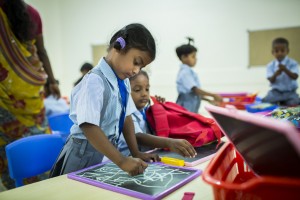
The first ever school outside of the UK supported by an academy network held a special celebration assembly today, four months after opening. The school, Lajpat-Nagar III Primary School in South Delhi, India was established through a new partnership between Ark and the South Delhi Municipal Corporation (SDMC), the local government, and is free to attend.
The SDMC educates children from the most underprivileged backgrounds in South Delhi. It runs 589 primary schools, many of which are struggling with declining student rolls due to parents opting for private schools. If successful, Ark hope to open a network of primary schools in South Delhi, which could in turn provide a model for education reform across India.
Ark is a founding partner of The Education Alliance, a group of NGOs and foundations, registered in India to facilitate similar partnerships in education with a view to improve education quality and widen the set of choices available to the economically weaker sections of society. The focus of education leaders in India is increasingly moving away from enrolment to quality. Indian parents are choosing private schools over public schools, but these don’t always address issues of equity. New models of schooling are urgently needed to provide high quality education to the disadvantaged. While participation has increased remarkably since the Right of Children to Free and Compulsory Education Act in 2009, quality still lags behind: a 2013 study found that 47 per cent of children in Grade 5 could not read a Grade 2 text.
Through an effective partnership with the South Delhi Municipal Corporation, the school has made remarkable progress in four months. Due to under-enrolment and a shift of children towards private schools, this school building was previously dilapidated and under-utilised, with only nine pupils enrolled in Kindergarten and Grade 1. There are now 120 pupils enrolled, with an overall attendance rate of 83%. 
The majority of families served by the school have low incomes and fall into the government designated ‘Economically Weaker Sections’ category. Many of the children attending will be the first of their families to go to school. Few have access to toys, learning materials or books at home. They have not had stories read to them by adults. As a result, there is much that the children have needed to develop cognitively. The pupils are making progress in mathematics and vocabulary skills, and now have exemplary behaviour. There has been tremendous growth in their cognitive ability and attention span – they are able to listen to a story or follow class room instructions with a sustained level of concentration.
Kruti Bharucha, Director of Ark India, said:
“Our goal is not just to provide an outstanding primary school in South Delhi, but also to demonstrate the impact that innovative and successful educational approaches can have on the Indian education system as a whole.”
Ark has received great support and built a strong partnership with the South Delhi government. The South Delhi Municipal Corporation has supported a move towards focusing on quality education and ensuring that all children receive access to an excellent education and equal opportunity to succeed in life. The school has also had generous support from Swarovski Foundation.
Successes to Date
Transformations in behaviour
• When they started school in July, the pupils did not have a clear understanding of the correct, expected school behaviour. Now, thanks to the behaviour management system that Ark has put in place, the children’s behaviour in school is exemplary. They line up, wait for their turn, follow class rules and engage in collaborative study and play.
Engagement levels in the classrooms
• Over the last few months we have seen a huge growth in the children’s attention span. They are now able to continue with an activity that they find interesting for as long as 30 minutes and they are able also to listen to a story or follow class room instructions with a more sustained level of concentration.
Initial learning level improvements
• The learning levels of the children were very low when they started school. Research shows that playing with toys from early childhood improves cognitive development. Our children have not had access to toys, learning materials or books.
• Over the last 3-4 months the children have shown tremendous growth in their cognitive ability. They are now able to sort and name colours, identify and name shapes, create their own patterns out of abstract materials and identify relationships such as more and less, bigger and smaller. They are developing number sense and a wider vocabulary.